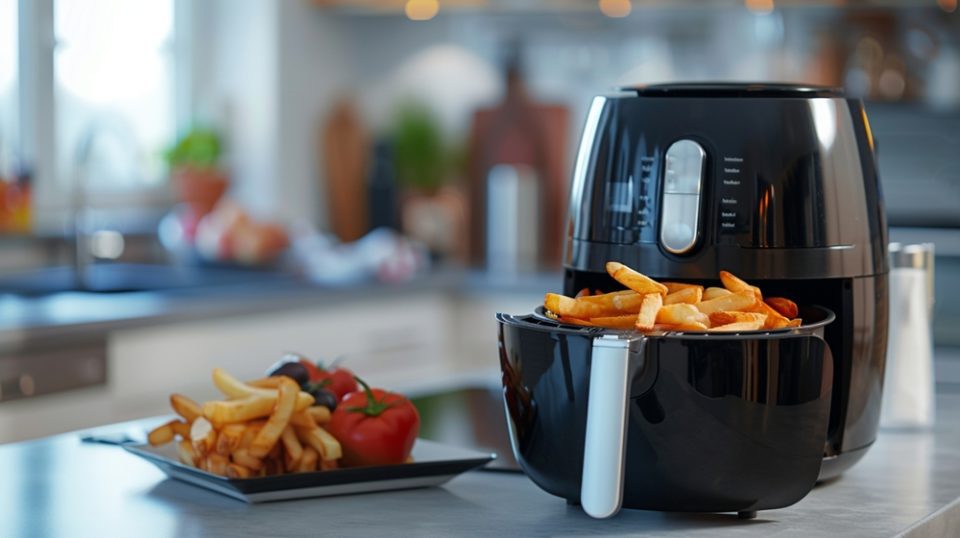New research reveals how modern cooking methods impact indoor health

Understanding air fryer technology
Air fryers have rapidly gained popularity in kitchens around the world, touted for their ability to cook crispy, delicious meals with little to no oil. However, recent research has uncovered an additional, perhaps surprising, benefit to using air fryers. Beyond their convenience and health benefits, air fryers have been shown to significantly improve indoor air quality by reducing the levels of pollutants typically emitted during cooking. This revelation adds a new layer of appeal to an already beloved kitchen appliance.
Scientific evidence of air quality impact
Studies conducted by leading health and environmental organizations show that air fryers can significantly reduce the levels of indoor air pollutants compared to traditional cooking methods. Researchers measured the particulate matter and volatile organic compounds (VOCs) released during cooking and found that air fryers consistently produced lower concentrations of these harmful substances than methods like frying or grilling. This discovery is crucial, as exposure to particulate matter and VOCs can have adverse effects on respiratory health, particularly in poorly ventilated spaces.
Comparative cooking emissions
One of the key factors contributing to the healthier indoor air quality associated with air fryers is the reduced emissions produced during the cooking process. Traditional methods of frying, grilling, or boiling tend to release large amounts of cooking-related pollutants into the air. These pollutants can include particulate matter, which consists of tiny particles that can penetrate the lungs, and VOCs, which can cause dizziness, headaches, and irritation to the eyes and throat.
In contrast, air fryers operate by circulating hot air around the food, which significantly reduces the release of these pollutants into the air. The decrease in particulate matter and VOC emissions from air frying represents a major improvement over more traditional cooking methods, which can contribute to poor indoor air quality, especially in kitchens with inadequate ventilation.
Health implications
The benefits of using air fryers extend beyond just improving indoor air quality; they may also have positive implications for overall health, particularly respiratory health. The significant reduction in the number of pollutants released into the air during cooking can help minimize exposure to harmful substances that could otherwise contribute to long-term health problems.
For households that cook frequently, reducing the amount of particulate matter and VOCs in the air can be particularly beneficial. These pollutants have been linked to a variety of health issues, including asthma, respiratory infections, and even cardiovascular diseases. By cutting down on exposure to these harmful substances, air fryers could play a role in reducing the risk of developing such conditions.
Technical operation benefits
The secret behind the air fryer’s ability to reduce air pollution lies in its design. Air fryers use rapid air circulation to cook food quickly and evenly, which creates a contained cooking environment that minimizes the release of pollutants into the surrounding air. Unlike deep frying or grilling, which rely on oil or open flames, air fryers use hot air alone to cook food, making them a cleaner and more efficient option.
This technology not only improves the efficiency of the cooking process but also makes it safer for indoor air quality. The ability to cook without the need for large quantities of oil or fat further reduces the chances of airborne pollutants being released. The technology’s efficient design allows for faster cooking times, reducing the time during which pollutants are emitted into the air, thus helping maintain better indoor air quality.
Practical implementation
Incorporating an air fryer into your cooking routine is easy, and it requires little adjustment to your current eating habits. Air fryers are versatile and can be used to cook a wide variety of foods, from vegetables and proteins to baked goods and snacks. Whether you’re preparing a quick dinner or meal prepping for the week, the air fryer can help you create healthier meals with less fat and fewer harmful cooking emissions.
The key to maximizing the air quality benefits of an air fryer is proper usage. Cooking with minimal oil not only enhances the health benefits of your meals but also ensures that the appliance works as efficiently as possible to reduce indoor pollutants. Most air fryers are equipped with adjustable temperature settings, allowing you to control cooking temperatures to ensure optimal results for different types of food.
Moreover, air fryers are also easy to clean and maintain, which ensures they continue to function efficiently over time. Regular cleaning helps prevent the buildup of grease and food particles, which can reduce the air fryer’s efficiency and lead to the release of unwanted particles during cooking. Keeping your air fryer in top condition is an essential part of maintaining the health and air quality benefits it provides.
Environmental considerations
The benefits of using an air fryer extend beyond just health and air quality improvements. These appliances are also more energy-efficient compared to traditional cooking methods, such as oven baking or deep frying. Air fryers cook food faster and at lower temperatures, which reduces energy consumption and minimizes the environmental impact of cooking.
Furthermore, air fryers help to reduce oil waste. Traditional frying methods require a large amount of oil, which often needs to be disposed of after use. With air fryers, little to no oil is required, meaning less waste and a more eco-friendly approach to meal preparation.
The reduction in oil usage is particularly important given the environmental impact of oil production and disposal. By minimizing the amount of oil needed, air fryers help contribute to a more sustainable and environmentally responsible way of cooking. As more people become aware of the environmental challenges associated with food production, the use of energy-efficient and low-waste appliances like air fryers can play a role in mitigating some of these impacts.
Conclusion
Air fryers have emerged as a kitchen appliance that not only provides healthier meal options but also contributes to a healthier indoor environment. With their ability to reduce harmful emissions and improve air quality, air fryers are proving to be more than just a trendy cooking tool – they are an essential addition to the modern kitchen. By embracing this technology, you can enjoy delicious, healthier meals while promoting better air quality and minimizing your environmental impact.













